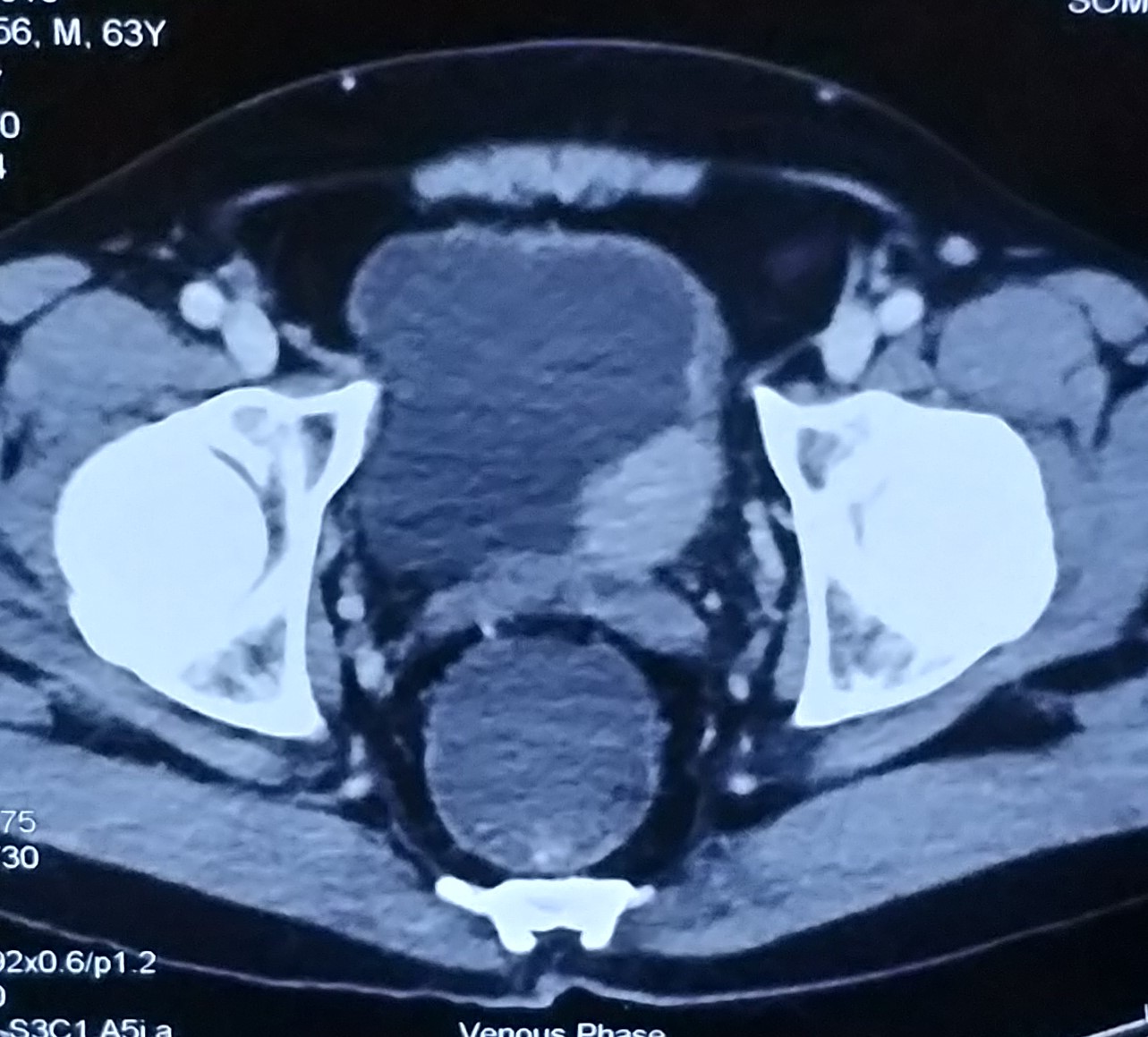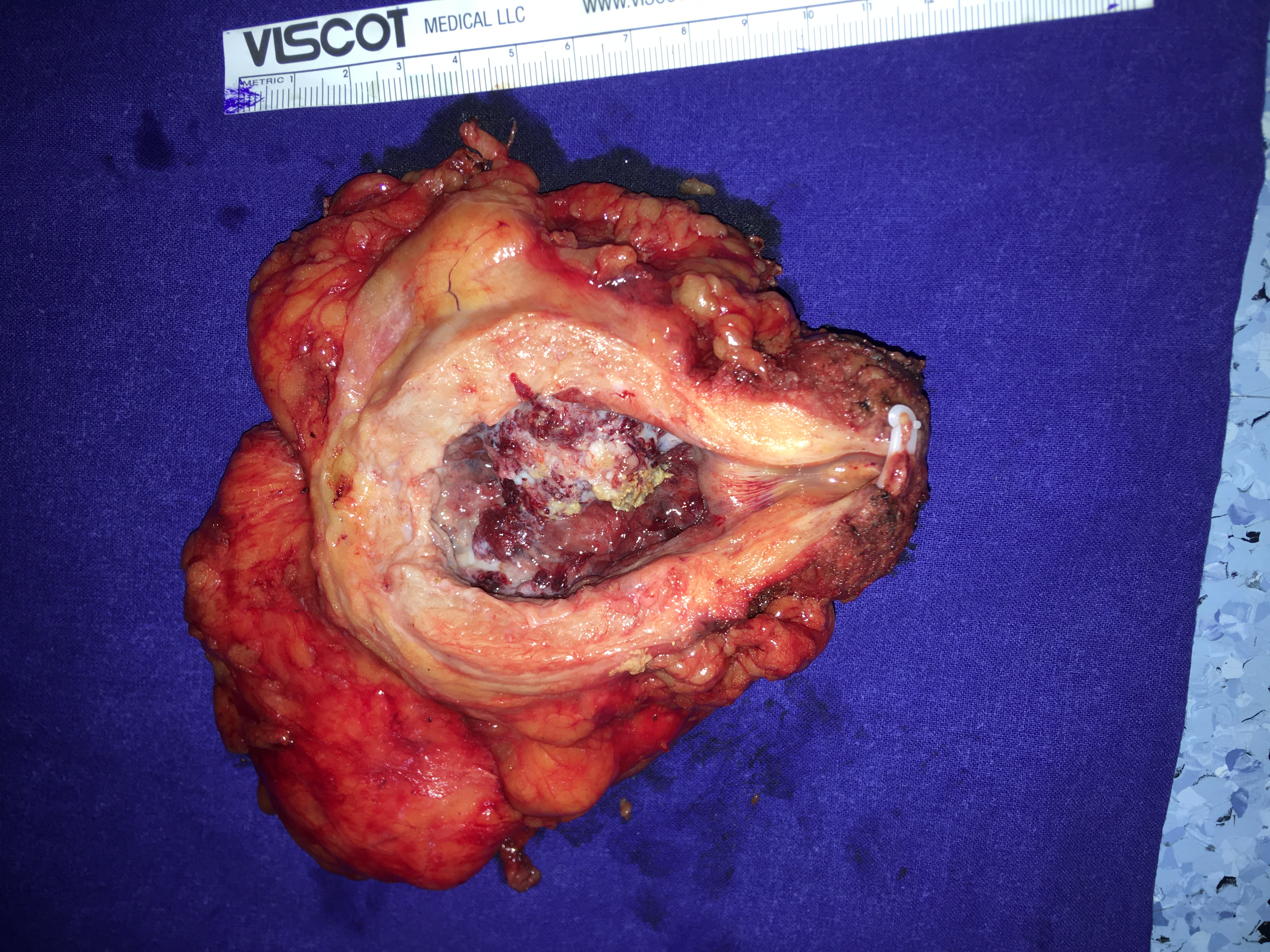Best Doctor for Bladder Cancer Treatment in Vashi, Navi Mumbai
Bladder Cancer : Types, Symptoms, Diagnosis & Treatment

Bladder Cancer CT Scan

Bladder with Tumor Inside
Dr. Varun Agarwal provides a personalized, effective treatment and Robotic Surgery for bladder cancer in Vashi, Navi Mumbai.
What is Bladder Cancer ?
Bladder cancer is a frequently occurring cancer that starts in the cells of your bladder. The bladder is a bag-like, muscular organ located in your lower belly area, and it's responsible for holding urine.
Bladder cancer predominantly affects individuals over the age of 55, with a notably higher incidence among men compared to women.
About 75 percent of bladder cancer cases are detected in the superficial stage.
Types of Bladder Cancer :
Bladder tumors can be broadly classified into two categories : benign and malignant.
Benign tumors are non-cancerous growths that typically do not invade surrounding tissues and rarely recur after treatment. In contrast, malignant tumors are cancerous and can regrow even after successful removal. They possess the capacity to invade nearby organs, such as the prostate in men or the uterus in women.
In more severe cases, these cancerous cells can break away from the primary tumor and spread through the bloodstream, leading to the formation of new tumors in different parts of the body, this process is known as metastasis.
Signs and Symptoms of Bladder Cancer
-
Presence of blood in urine (often appearing as a rusty color). -
Frequent and urgent need to urinate. -
Increased frequency of urination. -
Sensation of needing to urinate without results. -
Straining or discomfort during urination. -
Pain during urination.
It's important to remember that these symptoms could be caused by various health conditions, including infections. If you experience any of these signs, it's crucial to seek timely medical attention. You can consult with Dr. Varun Agarwal for guidance.
Risk Factors of Bladder Cancer
-
The most significant risk factor for bladder cancer is smoking which increases with the long-term duration. -
Certain occupational exposures, including industries involving dyes, rubber, paint, metals, textiles, and leather, elevate the risk of bladder cancer. -
Individuals who have undergone cancer treatment with specific drugs, such as cyclophosphamide, or radiation therapy in the abdominal or pelvic region, face a higher risk. -
Bladder cancer risk generally rises with age, with a higher incidence among individuals over 55. -
Some studies suggest that diets lacking sufficient fruits and vegetables may contribute to an increased risk of bladder cancer.
Certain occupations with a higher likelihood of chemical exposure include dry cleaners, painters, autoworkers, truck drivers, paper manufacturers, metal workers, plumbers, hairdressers, tire and rubber workers, and chemical and petroleum workers.
Diagnosis of Bladder Cancer
Diagnostic tests is done to confirm the presence of bladder cancer or determine its extent which include:
- Urine Cytology :
to identify cancer cells in urine directly collected from the bladder. - Ultra-sonography :
initial screening investigation to detect the presence of tumour - CT-Scan :
to detect the exact details of the tumour including it's size, number, location, dimensions along with presence of lymph nodes & extent of spread in the body. - Cystoscopy:
In this procedure, a thin, illuminated tube called a cystoscope is used to directly inspect the interior of the bladder. Local anesthesia may be necessary, as the cystoscope is inserted through the urethra into the bladder. - Biopsy:
A cystoscope can also be utilized to extract tissue samples for examination by a pathologist. Biopsy is often the most definitive method to confirm the presence of cancer
Stages of Bladder Cancer
Bladder cancer staging categorizes the disease based on its extent within the body and whether it has spread.
The stages are as follows:
- Stage 0 : Cancer cells are limited to the inner lining of the bladder (carcinoma in situ).
- Stage 1 : The tumor has penetrated deeper into the bladder lining but has not yet invaded the muscle layer.
- Stage 2 : The tumor has invaded the muscle layer.
- Stage 3 : Cancer has spread through the muscle and reached nearby tissues like the prostate, uterus, or vagina.
- Stage 4 : The tumor has infiltrated the pelvic or abdominal wall, but lymph nodes remain unaffected. Alternatively, cancer cells have metastasized to distant body parts, including the liver, lungs, or bones.
Treatment Options for Bladder Cancer
The choice of treatment for bladder cancer depends on several factors, including the patient's age, overall health, disease stage, tolerance to specific therapies, expectations, and preferences. Treatment options for bladder cancer encompass:
- Bladder Sparing Therapy : Particularly for early-stage cancer, this approach involves a biopsy and surgical removal of the tumor from the bladder through the urethra. Follow-up treatment may be administered when necessary.
- Surgery : Surgical options include transurethral resection (TUR) for early-stage cancer, which is a minimally invasive and bladder-sparing procedure. For more advanced cases, a cystectomy may be necessary, either partially (segmental cystectomy) or entirely (radical cystectomy). Robot-assisted procedures using the da Vinci Surgical System offer minimal invasiveness and faster recovery.
- Chemotherapy : Chemotherapy may be employed to shrink tumors prior to surgery, prevent post-surgery recurrence, or extend life in cases where surgery is not an option. Chemotherapy can be administered intravesically, orally, or intravenously based on the disease's characteristics.
- Biological Therapy : Patients with early bladder cancer may benefit from biological therapy, such as Bacillus Calmette-Guerin (BCG). This treatment stimulates the body's immune system to combat cancer. BCG is instilled into the bladder via a catheter.
- Radical Cystoprostatectomy (Bladder Removal) : In advanced cases necessitating complete bladder removal, surgical procedures can create alternative methods for urine collection. This includes the creation of a ileal conduit or neobladder depending on the patient's needs and physical condition.
Consult Dr. Varun Agarwal, Uro-oncologist, and Robotic Surgeon in Vashi, Navi Mumbai for a personalized bladder cancer treatment plan. We prioritize bladder preservation and use advanced surgical techniques for the best outcome based on your unique needs and preferences.
Meet our Uro-Oncologist and Robotic Surgeon






